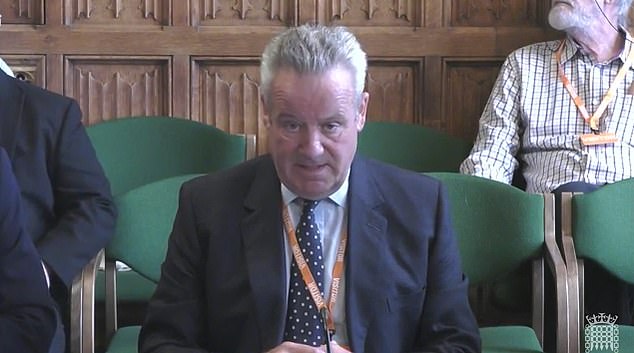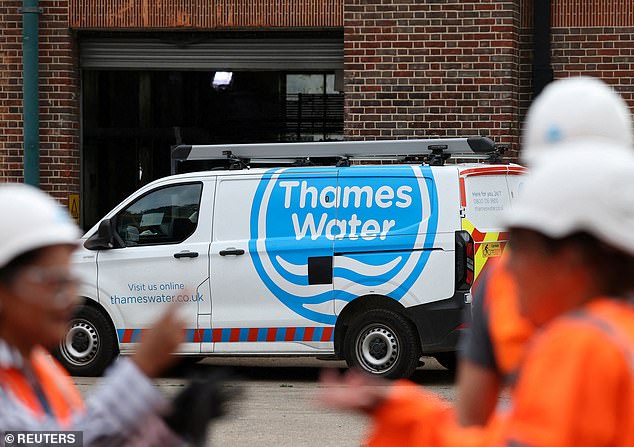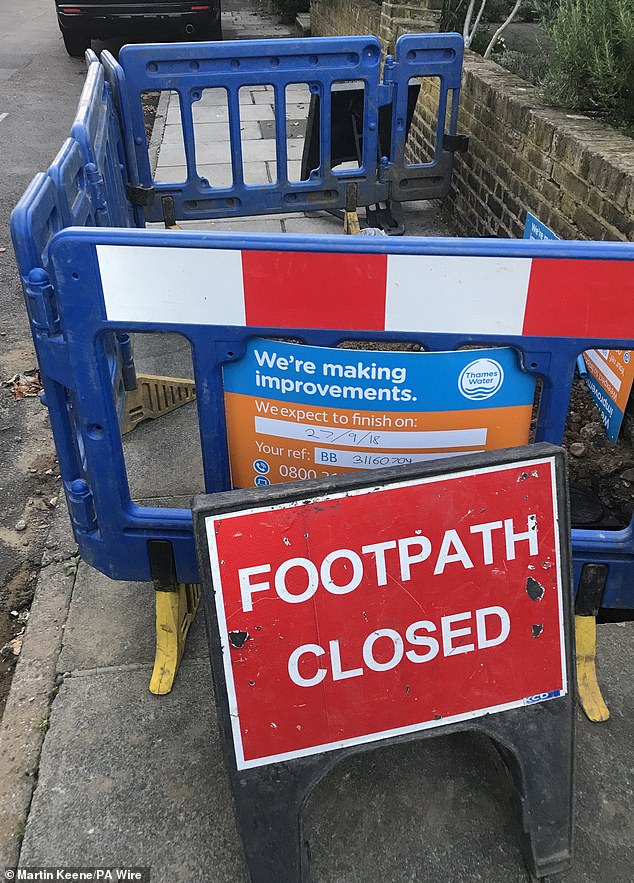Thames Water’s chief executive today blamed too much rain for a massive increase in sewage leaks – days after the ailing utility introduced a hosepipe ban for millions of customers.
Chris Weston complained that the network managed by the firm, criticised for handing massive bonuses to senior executives, could not cope with the downpours seen last year.
It came as Thames reported that sewage leaks rose by a third (34.3 per cent) as it recorded an astonishing pre-tax loss of £1.65billion, raising questioned about the very future of the business.
He was taken to task over the results released today as he faced MPs on the Environment Food and Rural Affairs Committee in Westminster.
Yesterday Thames announced a hosepipe ban will begin next Tuesday for customers in Oxfordshire, Gloucestershire, most of Wiltshire and some parts of Berkshire.
Committee chairman Alistair Carmichael told him: ‘Not a particularly happy story this morning on overflows is it? Your report indicates you had ”too much rain” leading to overflows a week before you put us into a hosepipe ban?’
Mr Weston replied: ‘I know, and I’m sorry about that. But the weather, I’m afraid, is a reason, not an excuse.

Chris Weston gave MPs the dismal outlook as he and other senior executives were hauled back to parliament to face questions about their performance.

Thames has come in for major criticism, particularly for paying out huge bonuses to senior staff while putting up bills and racking up debt.

It tumbled to the pre-tax loss in the year to March 31 from profits of £157 million the previous year.
Last winter before we came into the spring we had the second wettest winter on record.
‘There were some months like last September where the rainfall was double the normal monthly rainfall.
‘Our system was never intended to deal with that. We are taking huge steps to improve our position around pollution.’
Mr Weston went on to warn it could take a decade to sort out the problems at the utility.
Thames has come in for major criticism, particularly for paying out huge bonuses to senior staff while putting up bills and racking up debt.
It tumbled to the pre-tax loss in the year to March 31 from profits of £157 million the previous year.
Results from Britain’s biggest water supplier showed its net debts swelled by another £1.65 billion to £16.79 billion by the end of March.
It also revealed a ‘disappointing’ performance on pollution, with incidents surging to 470.
The figures come as the water firm – which has 16 million customers – remains locked in talks over a rescue funding deal with senior creditors after private equity firm KKR last month pulled out of plans to inject £4 billion of much-needed cash.
Mr Weston told the committee: ‘We are taking huge steps to improve our position around pollution; we are cleaning the network more than we ever have and we are investing more than we ever have in our sewage treatment works but it is going to take a while.
‘I think the work that KKR has done backs up the view that to turnaround, transform this company is going to take between five and 10 years, maybe a bit more.’
Thames’ bosses were brought back to Parliament to answer questions on bonuses for senior executives and the group’s plans for a rescue deal.
It recently emerged that £2.5 million of bonuses paid to senior Thames Water executives in April under a controversial ‘retention’ scheme cannot be recovered by regulators.
The firm said it had seen Ofwat performance penalties increase to £88.2 million in 2024-25 from £56.9 million the previous year as it missed regulatory targets.
Thames Water was fined a record £122.7 million in May after it was found to have broken rules over sewage treatment and paying out dividends.
The company’s chairman apologised to the committee this morning after being recalled to answer questions.
Sir Adrian Montague said: ‘It is rare for any company to be recalled; we regret that we have made that necessary.
‘We have tried to be as forthcoming as we can with our disclosures.
‘We will no doubt go into some of the reasons for the actions we have taken, but before we start I just want to say that I am sorry that we are taking up your time again.’
On Monday, Thames Water became the latest supplier to announce a hosepipe ban, which will begin next Tuesday for customers in Oxfordshire, Gloucestershire, most of Wiltshire and some parts of Berkshire.
Most of England could be placed under a hosepipe ban this summer, the Environment Agency has warned, joining millions of households already barred from watering their gardens this summer.
The agency is expected to set out plans today that could see several more regions officially designated as being in drought, following a meeting with government officials and industry leaders.
Up to five additional areas could face drought status by September, prompting further water restrictions as prolonged dry conditions persist.
Three regions, Cumbria and Lancashire, Yorkshire, and Greater Manchester, Merseyside and Cheshire, are already in drought, with three water firms having introduced hosepipe bans after an exceptionally dry spring.
Under the watchdog’s worst-case scenario, millions more across the Midlands and central southern England could face similar measures in the weeks ahead.
If England gets 80 per cent of its long-term average rainfall and warm temperatures over the coming weeks, the total number of areas given ‘drought’ status could reach eight by September, the agency forecasts.











